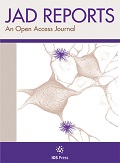Authors: Morrison-Koechl, Jill | Fearon, Danielle O. | Fernandes, Myra A. | Tyas, Suzanne L.
Article Type:
Research Article
Abstract:
Background: Risk factors for dementia, such as Alzheimer’s disease, are complex and span a lifetime. Exploring novel factors, such as characteristics of writing, may provide insight into dementia risk. Objective: To investigate the association between emotional expressivity and risk of dementia in the context of a previously identified risk factor, written language skills. Methods: The Nun Study recruited 678 religious sisters aged 75 + years. Of these, 149 U.S.-born participants had archived autobiographies handwritten at a mean age of 22 years. The autobiographies were scored for frequency of emotion word usage and language skills (e.g., idea density). The
…association of emotional expressivity and a four-level composite variable (combining high/low emotional expressivity and high/low idea density) with dementia was assessed using logistic regression models adjusted for age, education, and apolipoprotein E. Results: Within the composite variable, odds of dementia increased incrementally, with opposing effects of emotional expressivity across the two idea density levels. Compared to the referent category (low emotional expressivity/high idea density), the risk of dementia increased in those with high emotional expressivity/high idea density (OR = 2.73, 95% CI = 1.05–7.08), while those with low emotional expressivity/low idea density had the highest risk (OR = 18.58, 95% CI = 4.01–86.09). Conclusion: Dementia risk is better captured by inclusion of multiple measures relating to characteristics of writing. Emotional expressivity may be protective when individuals are at increased risk due to poor written language skills (i.e., low idea density), but detrimental when not at risk (i.e., high idea density). Our findings indicate that emotional expressivity is a contextually-dependent novel risk factor for dementia.
Show more
Keywords: Alzheimer’s disease, cognition, dementia, emotions, language, life course perspective, logistic models, longitudinal studies, risk factors
DOI: 10.3233/ADR-220106
Citation: Journal of Alzheimer's Disease Reports,
vol. 7, no. 1, pp. 317-326, 2023





